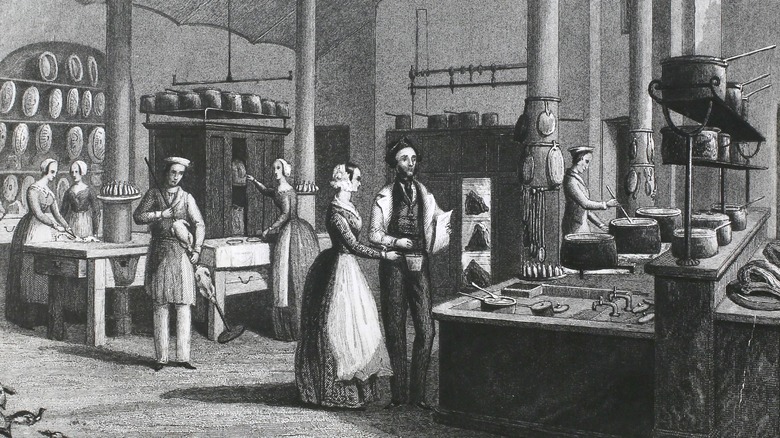Prue Leith's Food Hero Was A Victorian-Era Renaissance Man
In the era of the celebrity chef we all have our food heroes, whether they be comforting figures like Julia Child or globe-hopping firebrands like the late Anthony Bourdain. But, as "Great British Bake Off" host Prue Leith reminds us, the celebrities often have their own food heroes too. Leith has made a global name for herself after taking over for Mary Berry on the wildly popular British cooking competition. Between her excellent outfits and decades of baking knowledge, she has become an icon of British cooking, culminating in her being made a dame by the Queen in 2021 (via BBC).
Of course Leith is quite the renaissance woman beyond hosting a popular TV show. According to her website, she founded and ran a Michelin-starred restaurant, opened a cooking school, served on the board of multiple companies, including British Rail and Woolworths, ran multiple nonprofits, and has even published eight novels along with her cookbooks. But don't feel too bad after reading that because even with her exhaustive resume, Leith has her own accomplished hero she's chasing.
So, who was it? He was a chef, inventor, humanitarian, and celebrity in his own right, long before that was something chefs became.
Alexis Soyer was a 19th century celebrity chef
In a recent interview with the New York Times, Leith listed among her favorite food writers a "food hero," the Victorian-era chef Alexis Soyer. According to History Net, Soyer was a French chef who served as personal cook to the prime minister of France before decamping to England at the age of 21. He became a well-known man about town, cooking for some of London's biggest politicians, all while hustling for work and dressed to the nines in unusual custom outfits. Soyer's biographer says he was considered the greatest chef in the world at the time, and ended up authoring eight books himself, although Leith admitted to New York Times they are "mostly unreadable."
But like Leith, Soyer was more than just a famous chef. He went to Ireland during the Great Famine to work at soup kitchens, and fed the hungry by providing free guidance and recipes to poorhouses and hospitals in England, per History Net. He perhaps became most famous for volunteering to help Britain reform its poorly run kitchens that were feeding soldiers in the Crimean War. Soyer even tried his hands at inventing, including a clock that was a precursor to the modern day food timer. His busy life, and a fever contracted in Crimea, sadly took a toll on him and he died at the age of 48.
Despite his tragically short life, Soyer left an incredible legacy of social work and food innovation, one that cooks like Leith are still carrying on today.

